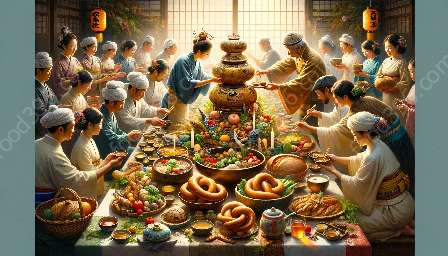Food taboos and beliefs have been an integral part of human culture since ancient times. Often intertwined with food rituals and symbolism, these traditions and practices vary across different cultures and have a profound impact on food culture and history. In this comprehensive discussion, we delve into the intriguing world of food-related taboos and beliefs, exploring their significance and impact on dietary traditions and practices.
Food Taboos: Unspoken Rules and Restrictions
Taboos surrounding food often revolve around certain items or ingredients that are considered forbidden or prohibited within a specific cultural or religious context. These taboos are deeply rooted in tradition and belief systems, and violating them can carry serious consequences. Common examples include the avoidance of certain animal meats, such as pork in Islamic and Jewish dietary laws, or the prohibition of consuming specific plants due to their sacred or symbolic significance.
Beliefs and Superstitions: The Cultural Significance of Food
Beliefs and superstitions related to food play a crucial role in shaping dietary practices and food-related rituals. These beliefs can range from the medicinal and healing properties of certain foods to the symbolic significance of particular dishes in religious ceremonies and celebrations. For example, certain cultures believe that consuming certain foods can bring good luck or ward off evil spirits, leading to specific rituals and customs surrounding meal preparation and consumption.
Food Rituals and Symbolism: Nourishment for the Body and Soul
Food rituals and symbolism are deeply intertwined with cultural and religious practices, serving as a means of expressing identity, values, and beliefs. From elaborate feasts that mark significant life events to the use of specific foods in symbolic rituals, the role of food extends beyond mere sustenance. Symbolic offerings and rituals serve as a bridge between the physical and spiritual realms, creating a sense of connection and transcendence through food-related practices.
Cultural Heritage and Food Culture
The cultural heritage and history of a community are often reflected in its culinary traditions and practices. Food serves as a powerful medium through which cultural identity is preserved, expressed, and shared. As such, food culture encompasses not only the types of foods consumed but also the customs, rituals, and social dynamics surrounding food preparation and consumption. Exploring the history of food culture provides valuable insights into the evolution of dietary traditions and the enduring impact of cultural beliefs and taboos on food practices.
Impact of Societal Changes on Food Taboos and Beliefs
As societies evolve and undergo cultural transformations, the dynamics of food taboos and beliefs also experience shifts. Globalization, technological advancements, and changing socio-economic factors have led to the reconsideration of traditional food taboos and beliefs in many communities. This has sparked debates and discussions regarding the preservation of cultural authenticity and the adaptation of food-related practices to meet the demands of a rapidly changing world.
Conclusion
Food taboos and beliefs, intertwined with food rituals, symbolism, and cultural history, offer a rich tapestry of traditions and practices that shape our relationship with food. By understanding the intricate connections between these elements, we gain a deeper appreciation for the diversity and cultural significance of dietary traditions around the world. As we continue to explore the multifaceted world of food culture, the influence of taboos and beliefs on food practices becomes increasingly apparent, highlighting the enduring connection between food and human experience.

